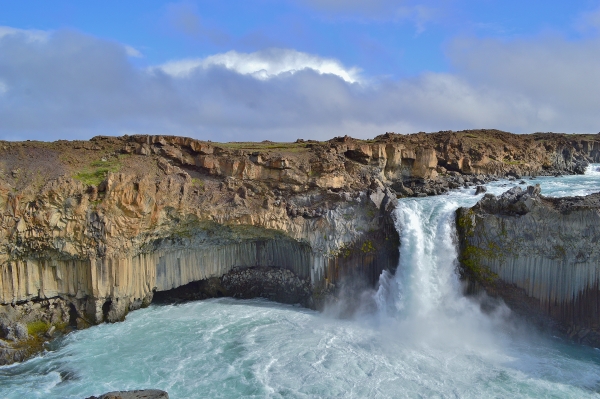Yesterday the draft proposal for the Master Plan for Nature Protection and Energy Utilization was released outlining which classifies which power plant options are to be considered and which areas should be taken out of consideration as options for energy utilization. Conservationists consider the draft a huge victory as it takes several controversial plans for hydro-power dams off the table. Including plans to build dams in Skjálfandifljót river in North East Iceland.
Read more: See the spectacular waterfalls in Skjálfandi river which would to be sacrificed for more electricity

Snorri Baldursson, the chairman of the Iceland Environment Association told the Icelandic National Broadcasting Service RÚV that the association viewed the result very positively, pointing out that the draft proposal has rejected any plans for energy utilization in three rivers in the Central Highlands, giving these areas a protected status. One of these is Skjálfandifljót river. With these latest decisions the area in the Central Highlands which has been given protected status has increased significantly, ensuring the protection of this vast untouched wilderness.
Some of Iceland’s most magnificent waterfalls will be protected
The draft proposals will now move to parliament. If the proposals are ratified, it would also mean that several of Iceland’s most spectacular waterfalls will remain untouched. These include the chain of waterfalls in Skjálfandifljót river upstream from Goðafoss waterfall. This chain of waterfalls would have been altered dramatically if plans by the National Power Utility to build a plant in the river had been realized.
Read more: Parliament to decide whether the entire central highlands will be made into a national park
According to a poll, which was released as part of the draft proposal, the vast majority of Icelanders support protecting the Central Highlands and oppose sacrificing untouched wilderness to produce hydro power for new energy intensive industries. 60% are opposed to increase energy production to power energy intensive industries, and 55% support the idea of turning the entire Central Highlands into a National Park.
Yesterday the draft proposal for the Master Plan for Nature Protection and Energy Utilization was released outlining which classifies which power plant options are to be considered and which areas should be taken out of consideration as options for energy utilization. Conservationists consider the draft a huge victory as it takes several controversial plans for hydro-power dams off the table. Including plans to build dams in Skjálfandifljót river in North East Iceland.
Read more: See the spectacular waterfalls in Skjálfandi river which would to be sacrificed for more electricity

Snorri Baldursson, the chairman of the Iceland Environment Association told the Icelandic National Broadcasting Service RÚV that the association viewed the result very positively, pointing out that the draft proposal has rejected any plans for energy utilization in three rivers in the Central Highlands, giving these areas a protected status. One of these is Skjálfandifljót river. With these latest decisions the area in the Central Highlands which has been given protected status has increased significantly, ensuring the protection of this vast untouched wilderness.
Some of Iceland’s most magnificent waterfalls will be protected
The draft proposals will now move to parliament. If the proposals are ratified, it would also mean that several of Iceland’s most spectacular waterfalls will remain untouched. These include the chain of waterfalls in Skjálfandifljót river upstream from Goðafoss waterfall. This chain of waterfalls would have been altered dramatically if plans by the National Power Utility to build a plant in the river had been realized.
Read more: Parliament to decide whether the entire central highlands will be made into a national park
According to a poll, which was released as part of the draft proposal, the vast majority of Icelanders support protecting the Central Highlands and oppose sacrificing untouched wilderness to produce hydro power for new energy intensive industries. 60% are opposed to increase energy production to power energy intensive industries, and 55% support the idea of turning the entire Central Highlands into a National Park.







